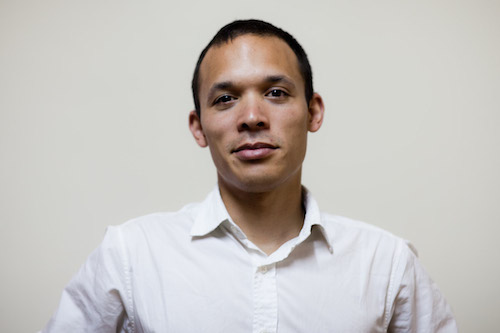
Nathan Cooke
When Nathan Cooke (BS 08 Product Design) was first approached by a group of entrepreneurs to help start a new venture centered on building toilets in developing countries, he wasn’t terribly taken with the idea. But seeing their determination, he decided to help them build a test toilet.
Five years later, Cooke and his colleagues are still working together. Cooke is co-founder and creative director of Sanergy, a social enterprise based in Nairobi, Kenya, with the mission of making hygienic sanitation affordable for everyone. Through Sanergy’s local brand, Fresh Life, the company franchises its Fresh Life Toilets to entrepreneurs in informal settlements. Franchisees, called Fresh Life Operators, make a profit by charging market rates for use of the toilets.
We checked in the Cooke during his most recent visit to campus for an update on lessons learned from launching this unique venture.

Founded by Nathan Cooke, Sanergy is a social enterprise based in Nairobi, Kenya making hygienic sanitation affordable, and accessible.
Art Center: Tell us about the spark that led you to want to make an impact on sanitation in developing countries?
Nathan Cooke: At the time, I was interested in international development, but not specifically in the issues of sanitation. I met some people who had an idea, but not the ability to realize it. So I helped them turn their concept into reality by designing a toilet. That was the start of Sanergy.
AC: What types of people are attracted to starting a Fresh Life franchise?
NC: A lot of them are local entrepreneurs who are already running small businesses. They might own a duka, or small shop, where they sell Coke or toiletries or other small things. The Fresh Life franchise offers them a new source of income, and often a way to improve their lives. One of our Operators, Agnes, had been making a living selling changa, illegal home-brewed alcohol. This required paying bribes to police officers. She started a Fresh Life franchise and was able to stop doing that and improve her situation. Another young woman told us that her options were to go into prostitution or start her own business. She became a Fresh Life Operator.
AC: What kind of support do you provide the Operators?
NC: We provide the toilet, the materials to clean the toilet, business analytics, marketing assistance and other forms of business support.
AC: What characterizes the more successful Operators?
NC: The two biggest draws for people are the chance to make a difference in their communities and the opportunity to make money. The people who are interested in making a difference in the communities do better. They tend to be happier and friendlier, which attracts repeat business. Ultimately, they tend to be more successful.
AC: Speaking of making a difference, you have given back to Art Center through your support of student scholarships. Why is that important to you?
NC: Part of it has to do with instructors I had, like Stan Kong, Frido Beisert and Heidrun Mumper-Drumm, who had passion for giving back through teaching. I had great instructors and I want to be able to give that back to students. I’m not teaching right now, though I’d love to get back to it someday. In the meantime, giving to scholarships is a way to support student education.
AC: What are some of the things you learned at Art Center that carry over into your work today?
NC: Design process and problem framing are at the top. Being able to communicate visually is also important. You don’t need a lot of technology to do this. Pencil and paper is often enough to sit down with someone and reframe their problem, or to sit down with a group of people and illustrate what everyone is talking about on a whiteboard and to get them all on the same page.
AC: Any advice for students coming up through Art Center now?
NC: Get a skill and get really good at it so people know to go to you for it, one that will allow you to demonstrate that you can provide clear value to an organization; but then also be able to articulate your value beyond that sole skill, because while that skill may get you in the door, it doesn’t define you.
To learn more about how to contribute to scholarships at Art Center, contact Emily Laskin.








